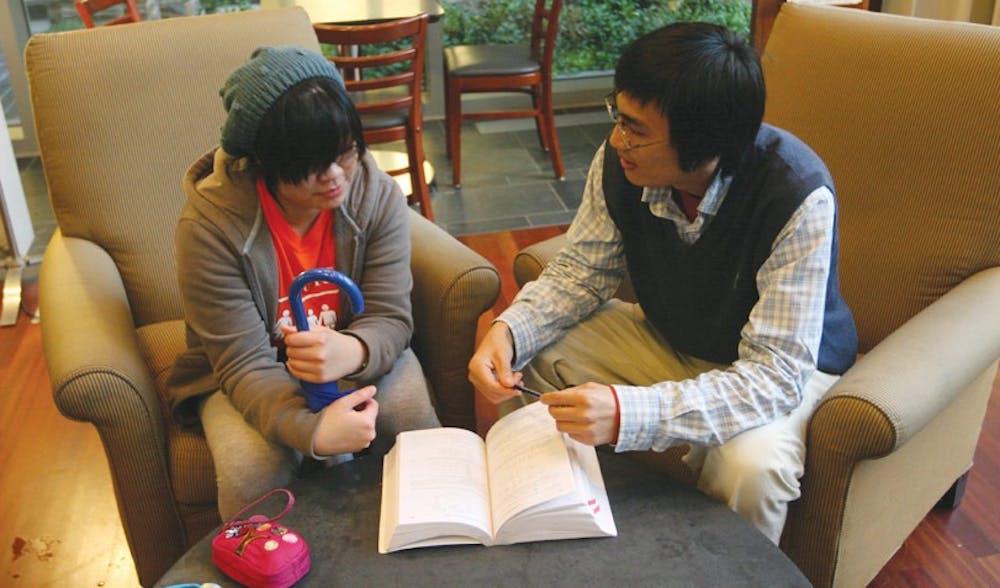As Duke continues to attract more students from throughout the world, the University is expanding efforts to make them feel comfortable in their new home.
The Intentional Association is working to implement changes to enhance the student experience for international students based on feedback received from five focus groups conducted in Fall 2009. The Domestic-International Conversational Exchange program, a collaborative effort between the International Association and Duke Student Government, held sessions with both international and domestic students across different cultural, academic and extra-curricular backgrounds.
The resulting memo focused on academic and social issues facing international students. Some students believe there is a lack of advising resources to aid them in their transition as well as insufficient career guidance for students who will not remain in the United States after graduation. DICE also noted that many international students feel excluded from greek life because at the time of recruitment, they often lack sufficient information to understand its role in Duke social life.
Since it was completed, the DICE memo has been sent to student leaders and discussed in the Council for Collaborative Action, an organization consisting of leaders of major campus associations, said International Association President Jason Li, a senior. He added that he is optimistic that changes will further enhance international students’ ability to get involved on campus.
“Imagine studying abroad in China—you would not want them to serve you hamburgers and show American television shows,” Li said. “International students decide to come here to live the Duke experience.”
DSG is also lobbying for policy changes, said sophomore Gurdane Bhutani, DSG vice president for student affairs. One such effort is pushing for need-blind admissions and financial aid for international students, Bhutani said.
Since that memo was released in November 2009, the International Association has worked with the Office of Undergraduate Admissions to create the International Ambassadors program, which was successfully launched in Fall 2009. The program aims to increase the amount of information foreign students receive about the University before they arrive on campus, Li said.
The program expands the Duke brand overseas in places that Duke admissions officers are otherwise not able to visit, said junior Vansh Muttreja, vice president of external affairs for the International Association who also heads the International Ambassadors program. The program expanded from 53 to 82 students between its first and second years, he noted.
The DICE memo also identified potential areas of improvement for International Orientation, which takes place two days before the general freshman orientation. The memo recommended extending the program’s length and increasing programming throughout freshman year. International Orientation still lasts for two days, but the International House has since created an information session titled “Connect, Learn and Grow” that aims to sustain bonds created during International Orientation and educate students about Duke life, said Yoko Hisano, program coordinator for the International House.
Not all international students have taken advantage of the new program, however. Only between four and six students showed up to a series on greek life in the Fall, said Zoila Airall, assistant vice president for Student Affairs. Still, the students who did attend all successfully completed recruitment and joined fraternities or sororities, she added.
Airall also noted that Writing 15, a new course started in Fall 2010 to be taken in conjunction with Writing 20, caters particularly to the needs of non-native English speaking students.
“A lot has happened since 2009,” Airall said, adding that this year there are also now specialized advisors for international students.
One challenge facing international student programs on campus, however, is that sometimes international students can be overwhelmed with all of the resources available to them and are not sure how to get started, Hisano said.
For other international students, the programs can contribute to self-segregation. Some students noted that programs like International Orientation can separate international students from the rest of the student body.
Some undergraduates avoid this self-segregation by not attending these programs. Anouska D’Abo, a freshman from the United Kingdom, said she did not attend International Orientation because she was afraid it might prevent her from assimilating into the American experience that brought her to Duke in the first place.
“I wanted to make friends with Americans. That’s why I went to Duke,” Anouska said. “If I wanted to make friends with international students, I would have gone to Brown.”
Get The Chronicle straight to your inbox
Signup for our weekly newsletter. Cancel at any time.

